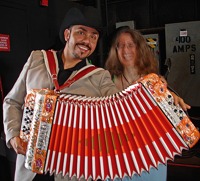
Country music's family ties
Polka band alumni include Pee Wee King, Willie Nelson
"There was a blending"The Los Angeles Times published this article about the increased demand in Nashville for accordions popular with norteño or conjunto musicians, and how that demand parallels increased migration to Nashville. Norteño/conjunto music has been described this way: "Though heavily influenced by German polka, you could say conjunto is the Mexican version of country music--sentimental, nostalgic, pastoral, and often embraced by the working class."
The L.A. Times article described the immigrants who have come to Nashville in recent years, and one Nashville councilman was quoted with this reaction: "'[I]t's kind of fun having the different flavors... At the same time, we don't have to lie down and give up our culture and heritage.'"
Is the influx of new music and new people a threat to old culture and heritage? Benjamin Franklin thought so, but he was worried about German immigrants changing U.S. culture and heritage, calling them, "a Colony of Aliens, who will shortly be so numerous as to Germanize us instead of our Anglifying them." (source: New York Times)
The sounds of norteño/conjunto music, as well as country music, are rooted in Germanic and Czech culture. Modern country music is a descendant of the immigrant influence that Benjamin Franklin feared: "The Germans did help Germanize the United States... There was a blending." - Rutgers University history and political science professor Daniel J. Tichenor, quoted in the New York Times
"In Texas, the pastoral folk music of northern Mexico (ranchero) blended with the Polka music of German immigrants to form the hybrid of conjunto. Country, too, is a hybrid, with its roots largely attributed to the folk music of Appalachia. But Tennessee isn't the only place that country developed--Texas lays claim to a lot of it, too. Much of the country sound was forged in Texas' dance halls, where German, Czech, and Mexican folk sounds merged." - Minnesota Public Radio Music Blog
"Polka, which originated from Bohemia, has also had a significant influence on norteño. Compared side-by-side, some styles of American polka may bear striking resemblance to norteño music. The polka beat is characteristic of norteño. At the turn of the 20th century, Bohemian immigrants flowed into Sinaloa, Mexico to farm the land and mine coal. German immigrants had also settled in large numbers in the cities of Monterrey, Nuevo Leon and Mazatlan, Sinaloa as early as the late 19th century. These German immigrants fueled the demand for a local brewing industry, and they also influenced the music scene by bringing the accordion and the polka rhythm, which were part of the popular music of their homeland." - Wikipedia
"A reed instrument developed in early nineteenth century Europe, the accordion is worn like a vest and consists of right and left hand keyboards that are connected by a bellows. Notes are produced by the bellows pushing air through valves which are controlled by the keyboard. The accordion is used primarily in conjunto, tejano and cowboy musics. The late accordionist Clifton Chenier set the standard for contemporary Cajun players like Zachary Richard. Basil Duhon, who works with Grand Ole Opry star Jimmy C. Newman, offers a cajun-style approach to the instrument. Flaco Jimenez is the most popular accordionist playing conjunto today." - Country Music Hall of Fame and Museum
"Country fiddling reflects a considerable amount of cultural synthesis. For example, the sliding into and out of notes - one of the distinguishing features of southern fiddling - is generally thought to be a stylistic trait derived from African-American music. Popular fiddlers such as Arthur Smith and Chubby Wise brought this bluesy trait to commercial country music. The Cajun music of French Louisiana has long had a tangential, but persistent, relationship to mainstream country music, with fiddling being perhaps the most distinctive Cajun music element that has influenced country. Aspects of repertoire and style of the German, Czech and Hispanic communities in the Southwest have been incorporated into the fiddling of that region and, by extension, into regional commercial country styles." - Country Music Hall of Fame and Museum
"Pee Wee King was an unlikely candidate for country music stardom. Yet as a songwriter, bandleader, recording artist, and television entertainer, he broke new ground in country music, and he helped to bring waltzes, polkas, and cowboy songs into mainstream country music during ten productive years at the Grand Ole Opry. Born Frank Julius Anthony Kuczynski into a working-class Polish-German family, he grew up in the polka-and-waltz culture of Wisconsin. His musical debut occurred at age fifteen, when he played the accordion in his father’s polka band." - Country Music Hall of Fame and Museum
"Growing up in central Texas, [Willie] Nelson came under the influence of a wide diversity of abiding musical influences—not just the Grand Ole Opry stars of the day, but also more indigenous sounds: the Texas honky-tonk of Ernest Tubb, the western swing of Bob Wills, and even the German-American polka bands he often played in as a youth." - Country Music Hall of Fame and Museum
See also PBS' Accordion Dreams
Photo by Lisa B

No comments:
Post a Comment